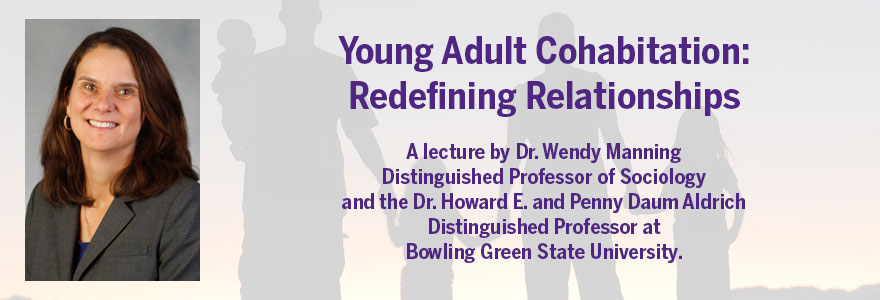News and Updates
Contact
Faculty of Social Science
Social Science Centre
Room 9438
Western University
T. 519-661-2053
F. 519-661-3868
E. social-science@uwo.ca
Young Adult Cohabitation: Redefining Relationships
October 17, 2019
Story by Rob Rombouts
The family form is changing; the rate of marriage among young people in the United States is decreasing, with many people delaying marriage, or simply not marrying. But does this mean young people are not forming family bonds?
Not necessarily, says Wendy Manning, Professor of Sociology at Bowling Green State University. On October 31st, Manning will deliver the Balakrishnan Distinguished Lecture in Population Dynamics and Inequality at Western University, entitled “Young Adult Cohabitation: Redefining Relationships.”
Manning will examine the trends and patterns of cohabitation among young people, aged 18 to 29, and what impact these trends have on their psychological and economic health.
Manning said more young people are cohabiting, or living together without being married. While, in the past, cohabitation was more common among people with lower levels of education, rates of cohabitation have been increasing in recent years for many demographic groups.
The longevity of cohabiting unions has changed as well; compared to cohabiting relationships in the past, cohabiting relationships last longer today.
“People in cohabiting unions have more options than those who are married” said Manning. “They can stay together in a cohabiting union, they can marry or they can break-up.”
A rise in cohabitation also leads to an increase in non-married mothers.
“The level of single motherhood hasn’t changed,” said Manning, “but levels of non-married mothers has increased. We don’t often think about this, but cohabiting often includes more than just two people. Just because people aren’t marrying, it doesn’t mean people aren’t having a family.”
Manning does not point to one factor leading to increased rates of cohabiting, but said it could be a combination of factors.
Economic circumstances have changed and many young adults face less certain futures. Many people may not finish their job training or enter stable jobs, and are left with jobs that do not provide the same economics prospects or stability.
Social factors play a role as well, with many young adults reporting they are afraid of divorce and want to avoid it, while also reporting that social stigma around cohabiting has decreased.
As rates increase, Manning said there are increased levels of economic and psychological uncertainty as a result.
“People are waiting so long to get married, and for them it could be positive as they are not going through divorce,” said Manning, “but they are really going through several relationships in young adulthood, some of which are co-residential relationships, and we haven’t thought about what that means.”
While not a focus of her research, Manning will speak to shifting rates in Canada as well, where there are two distinct trends. In Quebec, rates of cohabiting are higher and mimic European trends. Outside Quebec, trends are more similar to the US, said Manning.
The Balakrishnan Distinguished Lecture in Population Dynamics and Inequality, featuring Wendy Manning, will be delivered Thursday, October 31st, at 3:00 pm in Conran Hall, University College.

